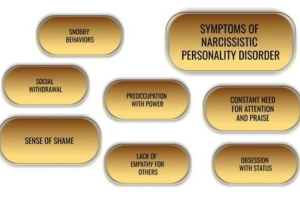Table of Contents
Narcissism: Symptoms and Signs
A narcissistic personality disorder (NPD) is a mental illness that makes people think they are superior to others and have unrealistic expectations of getting their way. Narcissism often believes they are entitled to special treatment and are “entitled” to receive admiration, adulation, and attention.

Narcissistic behaviors
The hallmark of narcissism is a lack of empathy. Narcissists are unable to see the world through other people’s eyes, and they don’t care about other people’s feelings or needs. They aren’t motivated by love or compassion; instead, they’re driven by their own desires and interests. They may have high self-esteem but they don’t take responsibility for their actions–they blame others for their own mistakes and failures (and when someone points out that the blame doesn’t make sense because you were the one who did it).
Narcissists tend to be selfish in many ways: They rarely care about anyone else’s needs except those related directly to them even then their motivation tends towards selfishness rather than altruism. This can cause problems with relationships as well because no matter how much someone tries or gives themselves away in an effort toward building trust with another person over time; if there is no reciprocation back then eventually those involved will lose interest altogether due to disinterest in both sides’ part which leads us into our next symptom listed below!

A history of trauma
Trauma can lead to narcissism. The term “trauma” refers to a serious emotional experience, such as being sexually abused or witnessing violence. When this kind of trauma occurs on a regular basis, it can cause a person to feel entitled, self-centered, and better than others.
Narcissists have experienced trauma themselves (or have been witnesses to the abuse of others). This makes them more likely than average people to develop narcissistic traits like grandiosity and self-focus. NPD sufferers may also feel entitled because their parents didn’t care enough about them when they needed them most–and therefore believe that no one else will either!
Secretive and selfish

Narcissistic personalities are secretive and selfish. They lack empathy, remorse, or guilt. They don’t show loyalty to friends or family members and they are not very loyal to the people they work with. Narcissists also lack a sense of humor which can lead them to be manipulative in order to get what they want from other people. Narcissists exploit others’ emotions and feelings without regard for the consequences they may cause as a result of their actions (e g someone might start an argument with someone else).
A sense of entitlement
Narcissism is a personality trait that results in the misguided perception of one’s self-importance and specialness. This means you may believe you are better than others, deserve special treatment, and should get whatever you want. Narcissist has an inflated sense of self-worth and believes they’re entitled to take advantage of others or treat them poorly.
Narcissists can also be manipulative–they use their knowledge of how society works to manipulate people into doing what they want them to do (or at least believe they want them to do). For example:
- Narcissists may put others down for themselves not to appear inferior or less potent than those around them; this will make them feel more confident about themselves because their peers don’t think highly enough about themselves either!
- If someone does something nice for us without expecting anything in return (like buying us lunch), a narcissist might try convincing us that our kindness resulted from his/her generosity instead!
Excessive need for admiration
Narcissism is a personality disorder characterized by a fixation on oneself that leads to an exaggerated sense of self-importance and an exaggerated concern with physical appearance, health, and strength. The Diagnostic and Statistical Manual of Mental Disorders, Fifth Edition (DSM5) lists six criteria for narcissistic personality disorder:
- A grandiose sense of self-importance (e.g., exaggerates achievements and talents)
- A lack of empathy for others (e.g., taking advantage of others without remorse)
- Romanticize own behaviors/feelings to the extent they are bizarre or unhealthy (e.g., sees one’s spouse as perfect despite repeated arguments)
A grandiose sense of self-importance
Narcissists believe that they are superior to others and this can lead to a grandiose sense of self-importance. They often exaggerate their talents, achievements, and worth. Narcissists often require excessive admiration from others in order to feel good about themselves. When people don’t meet these standards (or if the narcissist feels even modestly criticized), the narcissist may take advantage of them by manipulating or exploiting them for his or her own gain.
The entitlement issue is another common trait among narcissists — they expect special treatment because they think they deserve it! The only way you’re going to get any attention from this person is if he or she thinks you owe it to him/her! If someone else has been kind enough recently then payback time might be coming soon enough; so make sure whatever gifts were given were not wasted on just anyone (or anyone who shouldn’t be).
Pathological lying, whoring, and cheating
- Pathological lying – This is a common symptom of narcissism, and it can be difficult to identify. However, pathological liars will often have a pattern where they lie about things that don’t matter or are insignificant in order to cover up their real motives for doing so. For example, if you ask your partner how the weather was yesterday and he says “it was sunny and warm,” but he actually spent most of his time indoors with no windows open at all (and therefore didn’t see any sunlight), this may be an example of pathological lying.
- Whoring – Narcissists often use women as objects for their own gratification rather than taking care of them like they should since they don’t view themselves as worthy or worthy enough to care for another person’s needs. They’ll use other people’s bodies as props while simultaneously devaluing them because they feel entitled to do what they want without any regard whatsoever towards others involved in their lives–which can result in emotional abuse when those involved try telling them no or refusing them access at times when they need support most!
An excessive need for perfect love, adoration, admiration, and acceptance
Narcissists love to be adored, admired, and accepted. They have a high need for perfection and attention. Narcissists are hypersensitive to criticism, and they react strongly when others criticize them or their actions.
Narcissists are often self-important, arrogant, and full of themselves–they believe that they’re better than everyone else in every way possible (even if they aren’t).
While most people know what it’s like to feel good about yourself sometimes, narcissists go overboard on the positive side of things with little regard for reality or consequences; hence why we call them narcissists!
A narcissistic personality disorder
A narcissistic personality disorder can seriously damage your relationships with others.
People with this condition are self-absorbed, unable to empathize with others, and, in many cases, they can be charming and charismatic. They may even seem like they care about you but when you’re alone with them one-on-one they’ll quickly turn into a different person altogether–one who will lie to you about everything from the smallest detail to your personal life history; who may have affairs behind your back; who will embarrass you in public places (which could lead to stalking); and more.
Narcissists also tend not only to be cruel but also manipulative: they tend towards emotional abuse (gaslighting) as well as physical abuse (bullying).
Conclusion
A narcissistic personality disorder is a serious mental illness that can lead to depression, anxiety, and even suicide. If you suspect your partner has a narcissistic personality disorder, take action immediately. The sooner you seek treatment for yourself or your loved one, the better chance they have of overcoming their condition and improving their quality of life.
